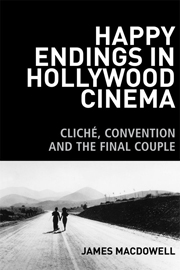Conclusion Provisions for the future
Published online by Cambridge University Press: 05 October 2013
Summary
How does one conclude a book about the complexities of endings? Given my recurring interest in how happy endings tend to contain promises of continuation, it seems inescapable that I should end by hinting at what future scholarly work on this convention might look like. First, though, a few words about what we have learned.
Clearly, the ‘happy ending’ is not as simple as is commonly assumed. This is unsurprising, however, since most assumptions about how simple the convention is have themselves been notable precisely for their tendency to oversimplify. Indeed, if being uncharitable we could say that the true homogeneous cliché at this point is not the ‘happy ending’, but the critical orthodoxy surrounding it. Having said this, as we have seen, there certainly has nonetheless been useful work that has delved more deeply into cinematic happy endings than most, and such scholarship will be invaluable for any future researchers on the subject. There is also perhaps, however, something to be learned from more familiar strands of film studies’ engagement with the convention.
Surveying critical references to the ‘happy ending’, it is striking how commonly the words are placed between inverted commas. Rather than indicating that the term itself is problematic, however, the qualification usually seems intended to convey that it may not apply in this instance – that is: the critic intends to show that, in the case of whichever conclusion s/he is analysing, the ‘supposedly “happy ending” is really anything but’ (Schneider 2003: 87).
- Type
- Chapter
- Information
- Happy Endings in Hollywood CinemaCliche, Convention and the Final Couple, pp. 191 - 194Publisher: Edinburgh University PressPrint publication year: 2013



